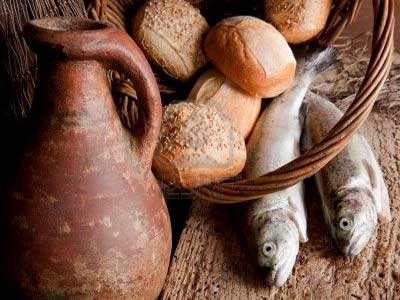17th Sunday of Ordinary Time - Practicing Eternity
All of Jesus' actions are "signs" that point to a deeper reality. Jesus sees our weaknesses, our tendencies towards selfishness, anger and pride and he understands how we long to become very different than we are. He experiences our mortality first hand and our longing for eternity. He sees the hungry crowd and moved with compassion he rouses the disciples to their feet and he feeds thousands.
 The story of the feeding of the five thousand is found twice each in the Gospels of Matthew and Mark, once in Luke and once in John. It is, In fact, the only miracle recorded in all four Gospels. Today we listen to the event as it is described by St John.
The story of the feeding of the five thousand is found twice each in the Gospels of Matthew and Mark, once in Luke and once in John. It is, In fact, the only miracle recorded in all four Gospels. Today we listen to the event as it is described by St John.
This is a powerful story, reminding us just exactly who God is: a nourishing, strengthening traveling companion, ever-present in our lives, who uses bread to draw us together as a caring community - a community which in turn feeds the poor, the hungry and the needy.
People have good reason to feel hungry and afraid today. Poverty, racism, natural disaster, unjust war and the killing of innocents - and so many other injustices - are bringing our world to the breaking point. It is understandable why people might lose hope. But it is only with faith do we have the ability to understand the reality of what is, and the possibility of what can be.
Today's Gospel story speaks a truth much greater than how few loaves and fishes can satisfy an immediate need. And that's because there is always something more to what we perceive to be Jesus' message. We are called and the same time we are sent forth. We are forgiven only to forgive others in the same way. We are fed, only to feed.
When God gives, he gives abundantly. He gives more than we need for ourselves so that we may have something to share with others, especially those who lack what they need. God takes the little we have and multiplies it for the good of others.
A few phrases come to mind from the Tao Te Ching, written by Lao-Tzu in the 5th century BC: "Seeing into darkness is clarity. Knowing how to yield is strength. Using the inner light, we can return to the source of light. This is called practicing eternity."
What has this to do with today's reading? Well, maybe everything. The past, present, and future become one in Christ Jesus. In this Bread of Life, the Eternal God and mortal mankind come together, here and now. Every time and every place become here and now.
Christ has called us to follow him. And in the continuing miracle that we celebrate in the Eucharist, he is teaching us how to practice eternity, giving us the nourishment we need to yield inwardly for the sake of God and neighbor, and just for a moment, giving us the vision and experience in the present of what our eternity can be.